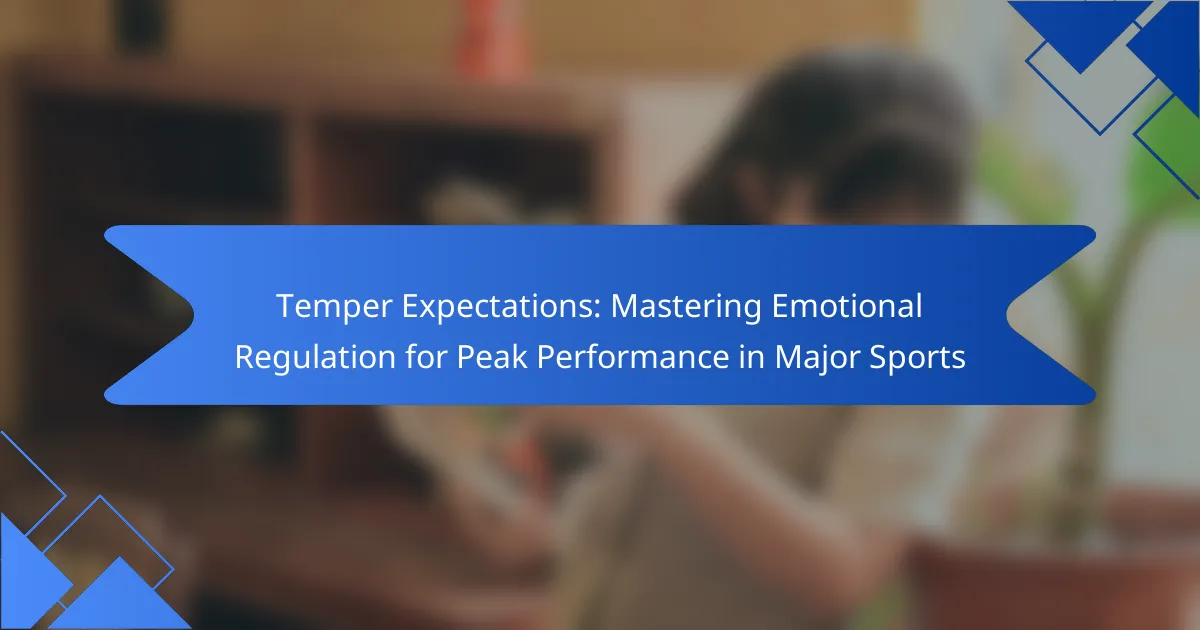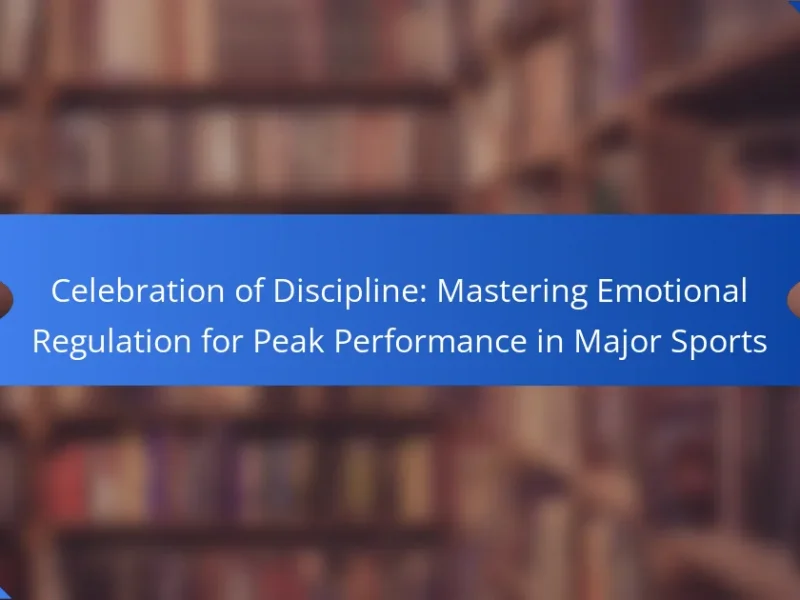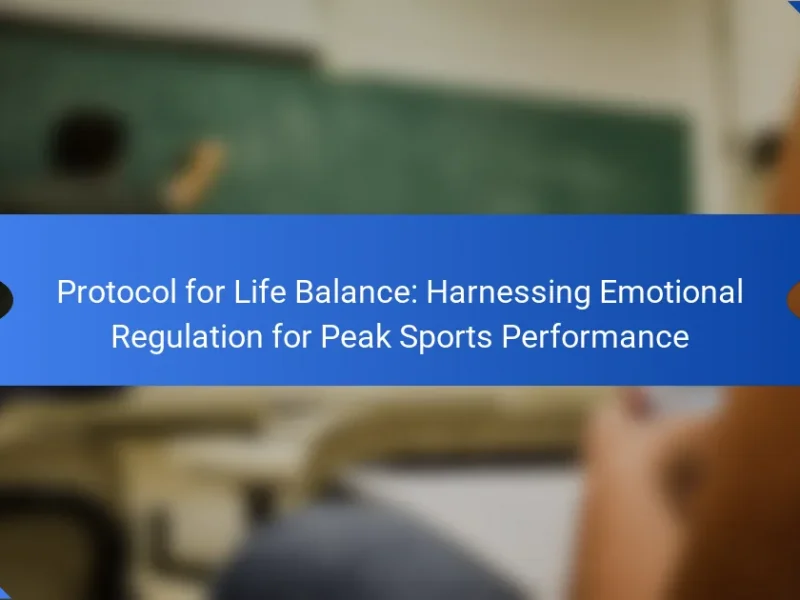Mastering emotional regulation is essential for athletes to enhance performance and manage stress effectively. This article explores techniques such as mindfulness and cognitive restructuring, the importance of awareness and acceptance, and the unique attributes that contribute to peak performance. It also discusses the challenges athletes face and how setting realistic expectations can foster a positive mindset. By implementing these strategies, athletes can improve focus and resilience in high-pressure situations.

What is Emotional Regulation in Major Sports?
Emotional regulation is crucial for athletes in major sports to manage stress and enhance performance. Mastering emotional regulation helps athletes maintain focus, control anxiety, and respond effectively to challenges. Techniques such as mindfulness, cognitive restructuring, and breathing exercises can improve emotional resilience. Research indicates that athletes with strong emotional regulation skills perform better under pressure, leading to improved outcomes in competitions.
Why is Emotional Regulation Critical for Athletes?
Emotional regulation is critical for athletes as it enhances performance and resilience under pressure. Mastering emotional responses allows athletes to maintain focus, manage stress, and make better decisions during competitions. Research indicates that athletes with strong emotional regulation skills often experience improved outcomes, including higher levels of satisfaction and reduced anxiety. Effective emotional management can lead to a unique competitive advantage, fostering peak performance in high-stakes situations.
How Do Emotional Regulation Systems Function?
Emotional regulation systems function by managing feelings to enhance performance. Athletes use techniques like cognitive restructuring and mindfulness to control emotions during competitions. These systems help maintain focus, reduce anxiety, and improve decision-making. Effective emotional regulation leads to increased resilience and optimal performance in major sports.

What are the Universal Attributes of Emotional Regulation Systems?
Emotional regulation systems universally include awareness, acceptance, and adaptive responses. These attributes help athletes manage emotions effectively for peak performance. Awareness allows recognition of emotional states, while acceptance fosters a non-judgmental approach. Adaptive responses enable appropriate actions in high-pressure situations. Mastering these attributes enhances resilience and focus, crucial for success in major sports.
How Do Emotions Impact Athletic Performance?
Emotions significantly influence athletic performance by affecting focus, motivation, and resilience. Mastering emotional regulation enables athletes to maintain composure under pressure, enhancing their overall effectiveness in competition.
Research indicates that athletes who effectively manage their emotions experience improved performance metrics. For instance, emotional intelligence correlates with better decision-making and strategic execution during high-stakes situations. Additionally, emotional regulation techniques, such as mindfulness and visualization, have been shown to reduce anxiety and increase confidence levels.
Athletes who temper their expectations and cultivate emotional resilience can better navigate challenges. This unique attribute of emotional mastery not only aids in performance but also contributes to long-term mental health and well-being in sports.
In summary, understanding and regulating emotions are crucial for peak performance in major sports, leading to a competitive advantage.
What Techniques are Commonly Used for Emotional Regulation?
Common techniques for emotional regulation in sports include cognitive restructuring, mindfulness practices, and controlled breathing. These techniques help athletes manage stress and maintain focus. Cognitive restructuring involves reframing negative thoughts to enhance performance. Mindfulness practices cultivate present-moment awareness, reducing anxiety. Controlled breathing techniques regulate physiological responses, promoting calmness and concentration. Each method supports peak performance by fostering emotional resilience and clarity.

What Unique Attributes Distinguish Emotional Regulation Systems in Major Sports?
Emotional regulation systems in major sports are distinguished by their unique attributes, including adaptability, focus, and resilience. These systems allow athletes to manage stress and maintain peak performance under pressure. Adaptability refers to the ability to adjust emotional responses based on situational demands. Focus emphasizes maintaining concentration despite distractions. Resilience highlights the capacity to recover from setbacks, crucial for sustained success. These unique attributes collectively enhance an athlete’s performance, enabling them to thrive in competitive environments.
How Do Different Sports Approach Emotional Regulation?
Different sports utilize various strategies for emotional regulation to enhance performance. Team sports often emphasize collective emotional management, fostering a supportive environment. Individual sports, however, focus on self-regulation techniques, like mindfulness and visualization. Research shows that athletes who master emotional regulation can improve focus and resilience, essential for peak performance. For instance, studies indicate that cognitive-behavioral strategies significantly reduce anxiety in competitive settings.
What Role Do Coaches Play in Emotional Regulation?
Coaches play a crucial role in emotional regulation by guiding athletes through mental challenges. They provide strategies for managing stress, enhancing focus, and maintaining composure during competition. Coaches often foster a supportive environment, encouraging open communication and resilience. This unique attribute of coaching can significantly impact an athlete’s performance and overall well-being. By tempering expectations, coaches help athletes master emotional regulation, leading to peak performance in major sports.

What are the Rare Attributes of Emotional Regulation in Sports?
Emotional regulation in sports includes rare attributes that enhance athletes’ performance. These attributes encompass resilience to pressure, adaptability to changing circumstances, and the ability to maintain focus amid distractions. Athletes who master these rare traits often achieve peak performance levels, setting them apart from their peers.
How Does Emotional Regulation Vary Among Elite Athletes?
Emotional regulation varies significantly among elite athletes, influencing their performance. Factors such as competition pressure and personal expectations shape their emotional responses.
Elite athletes often employ strategies like mindfulness and cognitive restructuring to manage emotions effectively. Research indicates that those with higher emotional intelligence tend to perform better under stress, showcasing a unique attribute in emotional regulation.
Moreover, the ability to adapt emotional responses can lead to improved focus and resilience, crucial for peak performance. This adaptability is a rare trait that distinguishes top performers from their peers.
In summary, mastering emotional regulation is essential for elite athletes, impacting their ability to succeed in high-stakes environments.
What Innovative Practices Are Emerging in Emotional Regulation?
Innovative practices in emotional regulation focus on techniques that enhance athletes’ performance. Techniques like mindfulness training, cognitive restructuring, and biofeedback are gaining traction. These methods help athletes manage stress and maintain focus, leading to improved outcomes. Research shows that mindfulness can reduce anxiety by up to 30%, while cognitive restructuring can enhance resilience. Integrating these practices into training regimens offers a unique advantage, promoting peak performance in high-stakes environments.

What Challenges Do Athletes Face in Emotional Regulation?
Athletes face significant challenges in emotional regulation, including pressure to perform, fear of failure, and managing stress. These factors can lead to anxiety and hinder peak performance. Effective strategies, such as mindfulness and cognitive restructuring, can enhance emotional resilience. Research shows that athletes who master emotional regulation tend to achieve higher levels of success.
How Can Athletes Overcome Emotional Regulation Challenges?
Athletes can overcome emotional regulation challenges by implementing strategies to temper expectations. This includes setting realistic performance goals, practicing mindfulness techniques, and developing resilience through mental training. Research indicates that athletes who manage their emotions effectively experience improved focus and performance under pressure. Regularly assessing emotional states and seeking support from coaches or sports psychologists can further enhance emotional regulation skills.
What Impact Does Competition Have on Emotional Regulation?
Competition significantly enhances emotional regulation by fostering resilience and focus in athletes. High-stakes environments encourage individuals to adapt their emotional responses, leading to improved performance. Research indicates that athletes who effectively manage their emotions during competition experience better outcomes. This mastery of emotional regulation is crucial for maintaining peak performance, especially in major sports. As a result, competitive settings serve as a catalyst for developing emotional intelligence, which is a unique attribute of successful athletes.

What Best Practices Can Athletes Implement for Effective Emotional Regulation?
Athletes can enhance emotional regulation by setting realistic performance expectations. This practice reduces anxiety and fosters a positive mindset. Techniques include mindfulness, visualization, and routine assessments of emotional states. Consistent application of these strategies leads to improved focus and resilience during competitions. Emphasizing self-awareness helps athletes recognize triggers and manage responses effectively.
What Common Mistakes Should Athletes Avoid?
Athletes should avoid unrealistic expectations, overtraining, neglecting mental health, and poor communication with coaches. Mastering emotional regulation is crucial for peak performance. Unrealistic expectations can lead to disappointment and burnout. Overtraining increases injury risk and hampers performance. Neglecting mental health affects focus and resilience. Lastly, poor communication can hinder growth and trust with coaching staff.
How Can Mindfulness Techniques Enhance Emotional Regulation?
Mindfulness techniques significantly enhance emotional regulation by fostering awareness and control over emotional responses. These practices help athletes manage stress, reduce anxiety, and maintain focus during high-pressure situations, ultimately improving performance. Research indicates that regular mindfulness training can lead to a 30% increase in emotional resilience among athletes. By tempering expectations, athletes can approach competition with a balanced mindset, allowing for peak performance without the burden of excessive pressure.
What Resources Are Available for Athletes Seeking to Improve Emotional Regulation?
Athletes can access various resources to enhance emotional regulation, including workshops, counseling, and mental training programs. These resources focus on techniques like mindfulness, cognitive-behavioral strategies, and visualization to improve performance under pressure. Professional organizations often provide tailored support, emphasizing the importance of emotional resilience in sports. Engaging with sports psychologists can also offer personalized strategies to manage emotions effectively.


